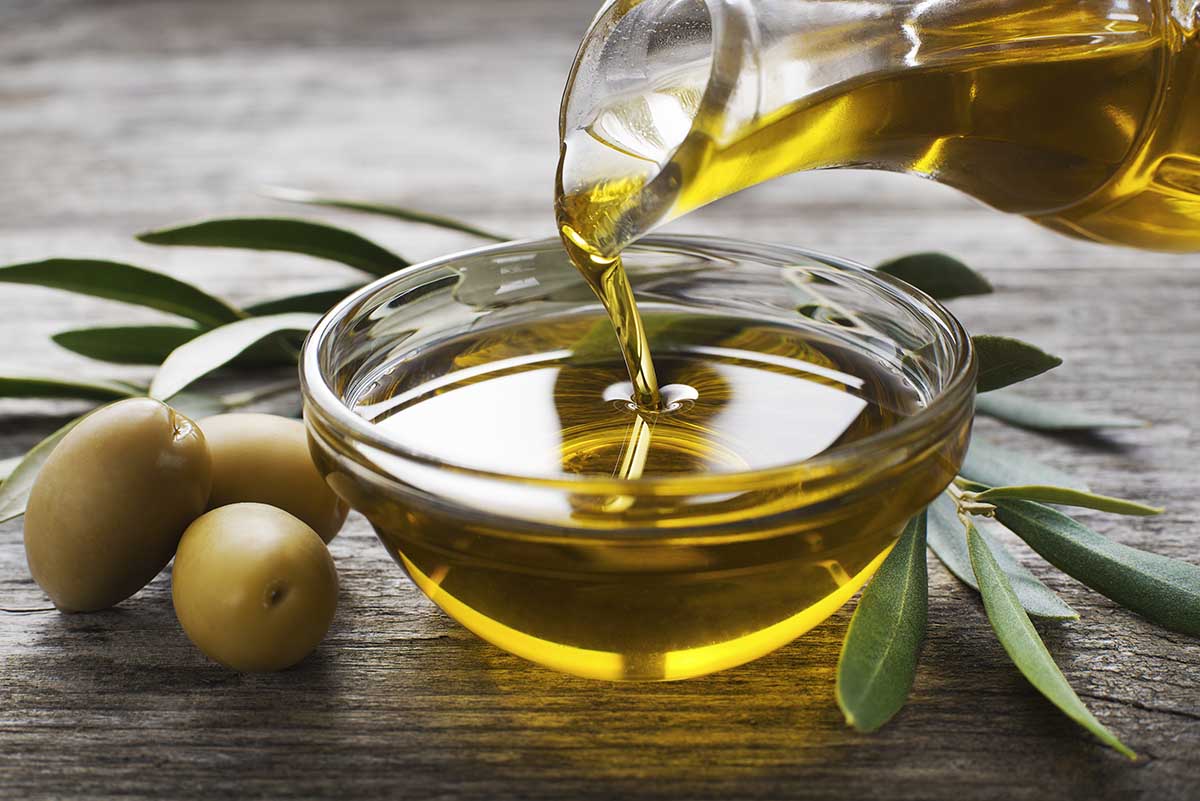Advertisement
10 Health Benefits of Olive Oil
A nutritious kitchen staple
Fact-Checked
This article has been written and fact-checked by experts in the field.

Decreases risk of heart disease and stroke
Olive oil is considered a top source of healthy fats. There are three grades of olive oil: extra virgin, virgin, and refined, with extra virgin being the least processed and refined being the most processed. Using olive oil in your diet can promote health in several ways.

According to the Centers for Disease Control and Prevention, nearly 665,000 Americans die from heart disease each year. While eating too much of certain fats can lead to blocked arteries, extra-virgin olive oil is a healthy fat that has been known to decrease the risk of heart disease. Adding it to your diet in moderation can help lower your cholesterol and keep your arteries from hardening, reducing your risk of stroke.
Lowers blood pressure

High blood pressure can lead to heart disease. Extra-virgin olive oil contains active compounds that help lower blood pressure. A study on hypertensive patients showed that olive oil had anti-hypertensive effects on participants. The study supports olive oil as a top choice of healthy fats when looking to manage or decrease the risk of hypertension.
Supports weight management

Because olive oil is a fat, using it for cooking or drizzling it on food can be filling and cause you to eat less. It is a main ingredient in the popular Mediterranean diet, which is known for promoting weight management. Following this diet may decrease your risk of heart disease, high blood pressure and cholesterol, diabetes, and certain cancers. Try these Mediterranean-inspired Chicken Tacos for a filling and healthy meal.
Helps with diabetes

Diabetes occurs when your body doesn’t make enough insulin or can’t use the insulin it makes. Maintaining a healthy weight, being active, and making small changes such as including olive oil in your recipes can help manage diabetes and improve sensitivity to insulin, resulting in better blood sugar control. The next time you’re looking for a dessert low in sugar and rich in healthy fats (from olive oil of course!), give this Honeyed Fruit Tart a try.
Offers anti-inflammatory properties

Inflammation in the body can lead to chronic diseases such as heart failure, diabetes, and cancer. Olive oil contains oleic acid, which is a monounsaturated fat and is anti-inflammatory.2 To benefit from its natural anti-inflammatory effects, consider using olive oil as a substitute for your salad dressing or seafood marinade.
High in antioxidants

Antioxidants are compounds that can lower the chances of free radicals damaging your cells. Extra-virgin olive oil is made by pressing the oil out of olives, so it goes through the least amount of processing compared to other types of olive oil. Because it is created without heat or chemicals, it’s full of nutrients and antioxidants called polyphenols. Combining extra-virgin olive oil with other foods rich in antioxidants can further enhance its health benefits. Craving chips? Try these Parmesan Kale Chips, made with extra-virgin olive oil.
Fights harmful bacteria

Bacteria can be helpful or harmful to your body. Nutrients in olive oil can help combat harmful bacteria. One of the noted bacteria that olive oil protects against is called Helicobacter pylori. This is a stomach bacterium that can contribute to causing ulcers and cancer. Olive oil has compounds that are said to help kill this bacteria, which is good news for your stomach.
Lowers risk of some cancers

Extra-virgin olive oil is high in phytochemicals that are said to help fight some cancers such as pancreatic, colorectal, endometrial, and prostate. Research on those eating a Mediterranean diet showed fewer people being diagnosed with certain cancers. The evidence suggests that incorporating olive oil in your meals may help prevent breast cancer and cancers affecting the digestive system.
Boosts brain activity

A study of participants on a Mediterranean diet showed that they were less likely to suffer from mild cognitive impairment. Diseases such as dementia and Alzheimer’s affect your memory, language, problem-solving, and thinking abilities. More research is needed to conclude the effects olive oil has on these diseases. However, research indicates that combining olive oil with other brain-boosting foods can improve your thinking, understanding, and memory skills. Peanut Butter Hummus, anyone?
Relieves constipation

Dehydration, a low-fiber diet, medicine, pregnancy, and stress are just a few causes of constipation. Naturally, you may consider drinking more water, eating more fruits and vegetables, or taking over-the-counter medication such as stool softeners to help, but what about olive oil?
A study on patients undergoing hemodialysis reported those consuming olive oil saw just as much of a reduction in their constipation symptoms and improvement in the consistency of their stool as those consuming flaxseed and mineral oil. It concluded that 4 mL (3/4 tsp) of olive oil a day may be just what you need to keep constipation at bay.





